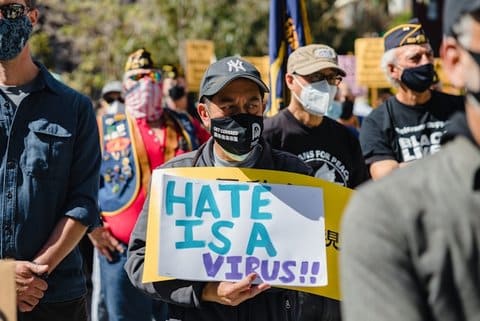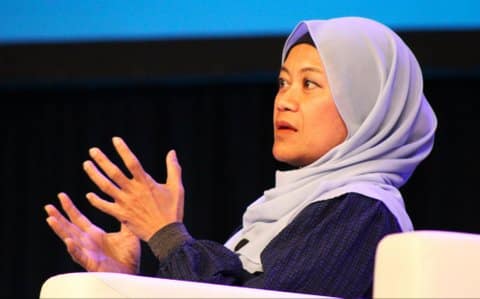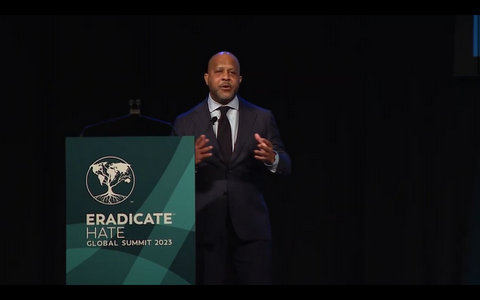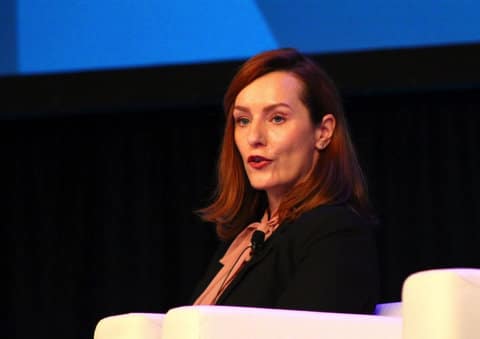
26 Feb Hate Is a Plague, One Physician Says

(Photo by Jason Leung on Unsplash)
Editor’s note: The Eradicate Hate Global Summit began in 2021 in response to the mass shooting at the Tree of Life synagogue. Last year, The CC Pulse was there for the first time in service of our Stop the Hate coverage. This is one of many stories we will publish that is about or inspired by the summit.
By Joe Porrello
Hate crimes and incidents can be diminished, in part, by treating bigotry like a contagious illness, according to one expert.
With over 50 years of experience as a physician in the infectious disease field, Dr. Jay Jacobson is now also trying to treat hate as chair of the Utah-based Community Partners Against Hate.
Formed in 2019, Community Partners gathers leaders of communities and state officials to advocate for increasing the reporting of hate crimes and to help others deal with bigotry.
While speaking on a panel at the 2023 Eradicate Hate Summit in Pittsburgh, Jacobson said one of the many similarities between hate and disease is reporting, which is needed to “to alert other physicians and the community about the threat posed so that we can take the steps to begin to interfere, to respond, and eventually to manage.”
Jacobson pointed out both bigotry and illness must first be revealed before they can be reduced; otherwise, each issue will worsen.
And both problems will spread — specifically by person-to-person transmission — if not addressed.
>>>Read: Disinformation Spreads Like a Disease, Expert Says
Referring to hate as a plague, Jacobson said people can look at one of his heroes — Dr. Li Wenliang — for an example on how to make a positive difference and the dangers of ignoring threats, whether medical or hate-based.
According to the BBC, Li texted a warning to his colleagues just before the end of the year in 2019 about COVID-19 before the outbreak was officially recognized.
“His texts circulated widely, ultimately to thousands of people in China, and then, eventually, to physicians like myself in the United States,” said Jacobson.
Four days following his warning, Li was told by police to sign a letter accusing him of “making false comments” that had “severely disturbed the social order,” according to the BBC. He began to feel ill himself shortly thereafter and was hospitalized Jan. 12 after being unable to care for himself while quarantining.
Jacobson said that despite his letter to cease and desist, Li documented his experience online to inform others.
He stood up for the world, then spoke out when he could no longer stand, said Jacobson.
Li was diagnosed with COVID-19 on Jan. 30, and died Feb. 7 at the age of 33.
Hate and disease have been intertwined in the years since as acts of hate reached significant levels during the COVID-19 pandemic, particularly against Asian people wrongly blamed for the disease.
>>>Read: Panel Urges Racial Solidarity in Response to Attacks on Asian Americans
The pandemic was first noticed and then managed by gathering information on the virus, which, according to Jacobson, is similar to how hate could partially be minimized.
“It takes a huge amount of knowledge on the complex problem that we’re facing; it takes lots of money, and it takes political will,” he said.
Community Partners Against Hate uses support from the governor of Utah, Salt Lake City mayor and police chief, and Salt Lake County district attorney in order to make strides reducing bigotry.
It took one step forward with its 2023 booklet that includes how to properly report hate crimes and incidents. The group initially made 4,000 copies — some in Spanish — and began distributing them at places like city or county libraries.
A public service announcement was also part of Community Partners’ strategy, “which we hope signals to our community the preparedness of our leaders, law enforcement, and each other to respond to hateful incidents and to support each other in the act of preventing the rising tide and epidemic of hatred that affects all of us,” said Jacobson.
He said the initiative also does hands-on work — with schools when they experience acts of hate, for example.
Jacobson pointed to Brigham Young University, which the group worked with after a Black player on the visiting team had racial slurs repeatedly shouted at them during a women’s volleyball game.
“I think more distressing than that to her and her coaches was that no one seemed to interfere or stop the individual who was shouting,” said Jacobson.
Community Partners Against Hate also testified before the Utah Legislature as part of its efforts to help pass legislation aimed at minimizing hate crimes.
In addition, the group contributed to the unanimous passing of state legislation specifically fighting antisemitism, said Jacobson. That bill’s push came on the heels of tech founder and major GOP donor David Bateman sending an antisemitic and anti-vaccine mass email to prominent Utah figures.
>>>Read: Vaccine Disinformation Preys on Black Community’s Well-Earned Distrust
While Jacobson and his coalition cannot ignore the shortcomings of some powerful Utah residents or their state’s diversity — like Community Partners member and summit attendee state Rep. Sandra Hollins being the only Black legislator in Utah — he noted they try remaining optimistic.
“Where we have struggled or failed is not unique to us, but we’re particularly proud of our accomplishments,” Jacobson said.
Eradicate Hate Global Summit co-chair Mark Nordenberg said he believes the initiative’s strategies can be even further instrumental in battling bigotry if duplicated.
“There’s a roadmap in Salt Lake City that might be adoptable in your own community,” he said.
This year, the Community Partners are planning a series of films and discussions, as well as urging the implementation of a state hotline to report hate crimes and incidents, according to the group’s website.
>>>Read: California Launches Hotline to Make Reporting Hate Crimes Easier
This resource is supported in whole or in part by funding provided by the State of California, administered by the California State Library in partnership with the California Department of Social Services and the California Commission on Asian and Pacific Islander American Affairs as part of the Stop the Hate program. To report a hate incident or hate crime and get support, go to CA vs Hate.






No Comments